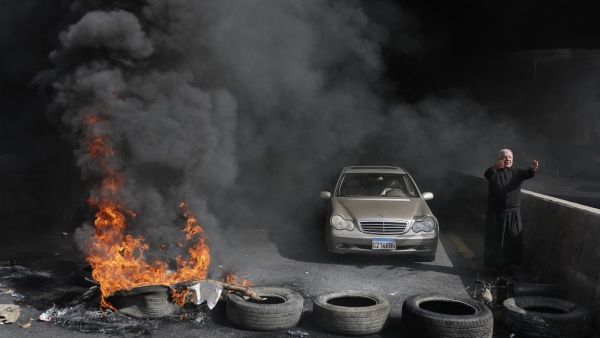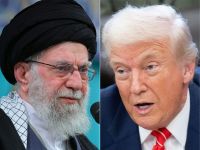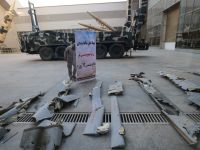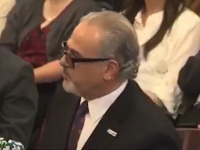Russia Tuesday underlined the importance of the quick formation of a “mission government” made up of technocrats in Lebanon to overcome the country’s severe economic and financial crisis, the worst in decades.
This came during a meeting between Prime Minister-designate Saad Hariri and Russian Foreign Minister Sergey Lavrov in Abu Dhabi, with talks focusing on the situation and developments in Lebanon and the region, including the Cabinet formation crisis, now in its seventh month.
The Russian position clearly supported Hariri’s insistence on a Cabinet of nonpartisan specialists and his refusal to include representatives of political parties in the new government.
Anti-government protesters are burning tires to block roads, creating dense palls of smoke that rise around Beirut and other parts of Lebanon. It's an expression of anger, but also helplessness @seldeeb writes. https://t.co/80QW0JAYt1
— AP Middle East (@APMiddleEast) March 10, 2021
Lavrov met during a work visit to Abu Dhabi with Hariri and the two discussed in “a deep manner viewpoints in order to put an end to the crisis-hit situation in Lebanon with focus on the importance of quickly overcoming the socio-economic crisis through the formation of a mission and capable government made up of technocrats,” a statement released by Hariri’s media office said, quoting a statement issued by the Russian Foreign Ministry.
The meeting also dealt with supporting the essential political forces in the country and Hariri and Lavrov discussed some regional problems, including intensifying the international community’s efforts in order to solve the Syrian crisis based on UN Security Council Resolution 2245, particularly the return of Syrian refugees to their homeland, the statement said.
It added that Lavrov and Hairri also discussed “new ideas” to develop and strengthen the Russian-Lebanese friendship relations and expand the commercial, investment and social exchange with emphasis on Russia’s assistance to Lebanon in fighting the coronavirus pandemic.
Hariri was also believed to have briefed Lavrov on the hurdles he was facing in his attempts to form a proposed 18-member Cabinet of nonpartisan specialists to enact essential reforms outlined in the French initiative designed to rescue Lebanon from its worst economic and financial crunch since the 1975-90 Civil War.
The meeting, also attended by Russian Deputy Foreign Minister and presidential special envoy for the Middle East and Africa Mikhail Bogdanov, comes amid reports that Russia supported Hariri’s proposal for the formation of a Cabinet of 18 nonpartisan experts without granting veto power to any party, one of major obstacles hindering the government formation.
Britain is enduring one of the strictest lockdowns in the world, an analysis by Oxford University has found.
— The Times (@thetimes) February 24, 2021
Only two governments, Venezuela and Lebanon, have introduced tougher policies https://t.co/63vh6N7J4v
Hariri, supported by France and Arab countries since his designation on Oct. 22 to form a new government to save Lebanon, has been on a visit to the United Arab Emirates since last Wednesday after waiting for days for a contact from President Michel Aoun to meet to discuss with him his proposed Cabinet lineup of 18 nonpartisan specialists he presented to the president on Dec. 9. Hariri’s trip to the UAE was part of his tour aimed at restoring Lebanon’s ties with Arab and friendly states. He has already visited Turkey, Egypt, Qatar and France. Media reports said Hariri planned to also visit Britain and Germany.
The Cabinet formation stalemate comes as the country has been gripped by nationwide street protests, including the closure of main roads and highways by angry residents, for the eighth consecutive day against the deteriorating economic and financial conditions.
Main roads around the country were once again blocked Tuesday with burning tires as disgruntled protesters called for the resignation of the ruling class for being incompetent and unable to rescue the country from multiple crises, including an unprecedented financial meltdown.
The street protests, which began last Tuesday, were triggered by a rapid and dramatic collapse of the Lebanese pound against the dollar, which traded at nearly 11,000 on the black market over the weekend for the first time in its history. The pound’s free fall has heightened fears of a further decline amid political uncertainty in the country and in the absence of serious efforts to break the Cabinet formation deadlock.
Officials from across the political fence have warned of an imminent “social explosion” and a subsequent security flare-up in the troubled country if a new government was not formed quickly to remedy the situation by implementing a slew of economic and administrative reforms desperately needed to unlock billions of dollars in promised international aid to the cash-strapped country that is teetering on the verge of a total economic collapse.
Aoun’s deepening rift with Hariri over the size and shape of the new Cabinet has left the country without a fully functioning government for more than six months.
The ongoing street protests have so far failed to revive talks between Aoun and Hariri on the Cabinet crisis and nudge them into softening their conflicting positions on key ministerial seats, namely the Justice and Interior ministries, and the naming of Christian ministers.
As part of his ongoing mediation efforts to narrow differences between Aoun and Hariri over the Cabinet formation, General Security chief Maj. Gen. Abbas Ibrahim met Tuesday with Maronite Patriarch Bechara al-Rai, discussing the latest developments in the Cabinet formation issue, the state-run National News Agency reported.
Ibrahim, who has been shuttling between Aoun, Hariri and Parliament Speaker Nabih Berri as part of his mediation bid, was reported to be promoting a proposal that would allow Aoun to name five ministers, in addition to the Armenian Tashnag party’s minister in the 18-member Cabinet.
As a solution to the problem of the Interior portfolio, which Hariri insists on controlling, Aoun was reported to have proposed the names of three nonpartisan candidates for Hariri to choose one of them.
Hariri said last week he was still waiting for Aoun’s approval of the proposed 18-member Cabinet of nonpartisan specialists to deliver reforms, while denying reports that he was awaiting Saudi Arabia’s consent.
In a televised speech last month, Hariri said Aoun had rejected the proposed Cabinet lineup because he wanted a share of six ministers, plus an Armenian Tashnag minister, or seven ministers, meaning a blocking third, or veto power. He also accused Aoun of blocking the formation of a new government by insisting on veto power. Hariri has vowed not to grant veto power to any party in the government.
Future Movement officials have said Hariri rejected a proposal, made by Free Patriotic Movement leader MP Gebran Bassil last month, for raising the proposed 18-member Cabinet to 20 or 22 ministers, to add two ministerial seats, one for the Druze sect and the other for the Melkite Greek Catholic sect.
This article has been adapted from its original source.








